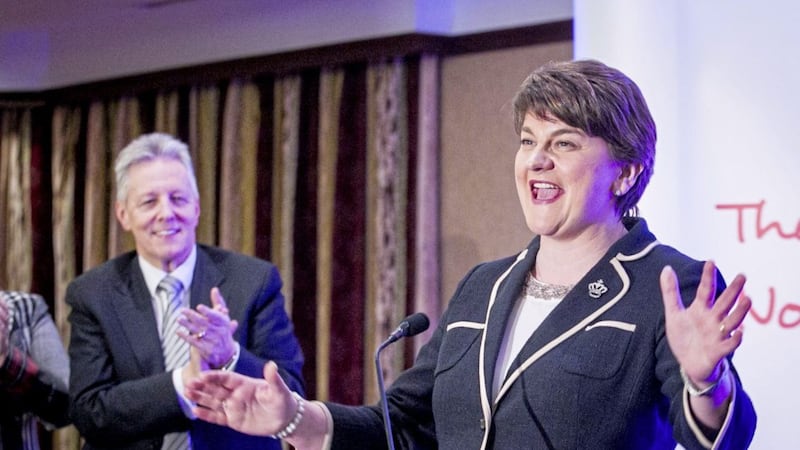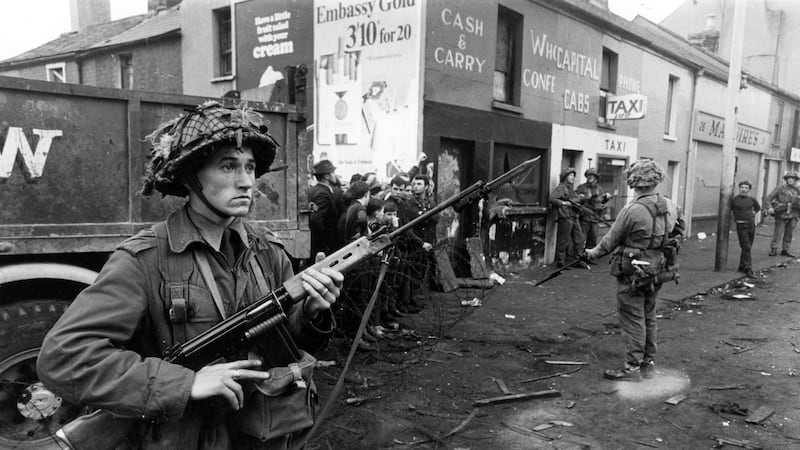Unionist anger at the Brexit debate is growing beyond just spray cans on walls, but who is really to blame?
Edwin Poots caused concern earlier this year after warning difficulties around the Irish Sea border could mean schools and hospitals would not be able to get food supplies.
That dire prediction has since changed somewhat from famine style conditions to arguments over English sausages and Amazon deliveries.
The most first world of first world issues.
As my mother would say when confronted with a complaint not worthy of a tantrum, 'wise up, there's people in the world with real problems'.
The problem unionists have with Brexit is not a practical one, as any issues regarding the protocol can - and already are - being dealt with.
The issue is an ideological one, and how they perceive they are being excluded from the rest of the UK.
That is a problem between unionism and the British government and is not something that can be blamed on the EU or the current administration in the south.
I have no doubt that many unionists are angry.
Angry at a pace of change that they were unprepared for.
Angry at the prime minister of a government they have have been fiercely loyal to having so little regard for their feelings, but mostly angry because unionist politicians have for decades constantly reminded them of their obligation to be angry.
Unionist anger, unionist outrage, unionist unrest, is not new and is not solely caused by the Northern Ireland Protocol.
I will never fully understand why the DUP championed Brexit.
Beyond the flag waving and the Rule Britannia sentiment surrounding the referendum build up, it seemed obvious that it would cause serious difficulties for the north and spark debate around the constitutional question.
That republicans and those pushing for a border poll would use the political fallout from Brexit to their advantage is hardly surprising.
Why would they not kick a ball into an open goal?
The DUP's answer to this, a five-point plan to resisting the protocol, had more than a whiff of Jim Allister off it.
But the problem for the party with this tactic is that the more hard line they become in order to appease their base, the more extreme their opponents will become in return.
The old guard, anti-agreement elements of the DUP can sense this and are encouraging this gravitational pull towards the extremes.
Loyalism is only too happy to facilitate this by piling on the pressure.
A letter said to be from 'all loyalist groups' in Ards and North Down, understood to mean the UDA, UVF and Red Hand Commando, didn't get much attention when released during a crowded news cycle at the weekend.
However, the letter stating there was “growing sentiment against all aspects of the peace process” will have raised the antenna of the PSNI who have been paying close attention to feeling on the ground.
In January, Assistant Chief Constable Mark McEwan told MPs at a Westminster committee hearing that police were monitoring "stress" and "growing discontent" within unionist communities over the Irish Sea border.
Adding that the health pandemic may be "moderating people's behaviour in terms of the desire to protest".
For this very reason politicians, regardless of what side of the Brexit debate they sit on, need to carefully consider the language they use.
The DUP are well tapped into the feelings of unionists and loyalists on the ground.
But they can never out Allister Jim Allister, so why even try?
To do so creates a situation where the DUP are being continually pulled in a direction of travel that will alienate more moderate unionists, and send them running where?
Back to where they came from in the UUP? That has not been the trend so far. Those voters are far more likely to end up in the Alliance camp, something that is devastating long term for the future of the union.
Former first minister Peter Robinson said last week that those unionists calling for the scrapping of the protocol should either "suck it up" or bring down Stormont.
Writing in the News Letter he also took aim at the DUP's five-point plan, suggesting a tougher approach was needed.
"One lesson learned after decades of dealing with governments is that they don’t yield unless life has become uncomfortable," he said.
"Statements and speeches will not turn them nor, frankly, will petitions and debates".
Strong language from a former party leader, who was known to compromise when the situation called for it during his time in power, but seems to enjoy throwing cats into pigeon sheds now that he is retired.
Now is not the time for settling scores against political opponents, nor bringing down institutions during a health pandemic.
Now is the time for leadership, but who is willing to step up to the podium and speak those uncomfortable truths?








